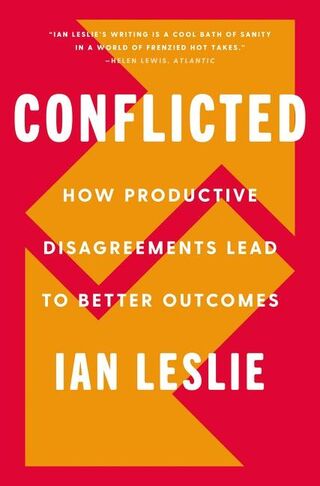Media
Productive Disagreement Is a Skill That Can Be Honed
Ian Leslie talks about his new book, "Conflicted," and how to disagree better.
Posted April 26, 2021 Reviewed by Matt Huston
Key points
- Disagreement can bring people closer together when it is done well, author Ian Leslie suggests.
- By avoiding disagreement, we may miss out on its benefits.
- Forging a connection with someone outside the disagreement and sharing a common goal may lead to better conversations.
Ian Leslie is a delightful writer who I first got to know through his book Curious: The Desire to Know and Why Your Future Depends on It. Ian is very good at combining storytelling with science writing and I often get lost in the references only to emerge much later, having learned so much about something new and in a way that made me rethink things. Thus, after reading his latest book, Conflicted, I asked him for an interview.

Why did you write this book?
Like many people, I've been struck by how toxic public discourse has become, and that's what started me thinking about the topic of disagreement. At first, I thought the book was going to be about how to resolve our differences amicably. But when I started researching this, I realized that our biggest problem isn't an excess of argument, it's an absence of it. We see so many toxic arguments play out on social media that we are very uncomfortable with disagreement. And so we avoid it—not just online, but at work and even at home. And when we do that we miss out on its immense benefits. Disagreement is a way of thinking, perhaps the best one we have. It makes us smarter and, counter-intuitively, it brings us closer together, when done well. If we don't disagree well, we make worse decisions and become alienated from one another.
Yet nobody trains us in how to do it well. Neither are we necessarily evolved for it. So it's about time we gave it more thought. We live in a world more primed for disagreement than ever in history and we're not remotely prepared for this. I want people to think of productive disagreement as a skill that can be practiced and honed.
What are the core elements of productive disagreement and why do they matter?
In broad strokes, what matters is that we have some kind of connection beyond the disagreement itself, and that we share a common goal of some kind. If the disagreement is only about the disagreement, it will quickly break down, because to engage in it we need to have faith in the other's intentions and goodwill. Often when someone appears to be acting irrationally or unpleasantly, it's because they're feeling insecure about the relationship they have with you or the image they think they're projecting. Skilled disagreers will help their adversaries feel better on both counts, which lowers their defenses and leads to a better conversation. Of course, if someone has no interest in an honest, productive disagreement, there's not much you can do about that. But you can do a lot, and often it's about showing them that you share a common goal—that you both want to get to the truth, or that you both care about solving the problem at hand.
Why has social media become polarized and what might you propose to improve dialogue?
Social media has become polarized because it is so much easier and more pleasurable to agree and be agreed with than it is to disagree with somebody. The latter forces you to think and to admit uncertainty; the former is impulsive and self-affirming. What seem like disagreements online are often just ways to avoid it. If I express scornful contempt for a point of view without engaging with the person who has it, then I am not really getting into a disagreement, I'm just making myself feel good, or seeking the approbation of my tribe. I don't think social media is a great place to disagree well at all, actually, but if you are going to have arguments there, try to make some human connection with your interlocutors before you get into it, try to avoid sarcasm even if they use it on you, and try to show them that in some sense you are both or all on the same side—even though you disagree on the point of contention.
How might the tools you propose improve science communication and education?
I think when you're delivering truths that might be counter-intuitive or hard to accept for the public, you need to acknowledge that their beliefs or fears are legitimate in some way. Scientists can sometimes seem as if they are dismissing every non-scientific belief as irrational or stupid, when often those beliefs conceal a deeper rationality. The basic principle is that in order for a disagreement or a tough conversation to go well, you need to get people to listen to you, and people only listen to you if they feel that you respect them.
References
Leslie, I. (2021). Conflicted: Why arguments are tearing us apart and how they can bring us together. New York, NY: HarperBusiness.


